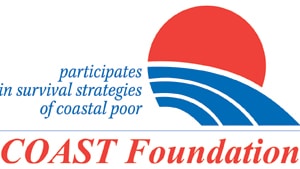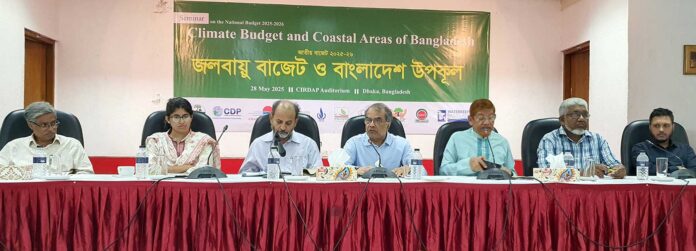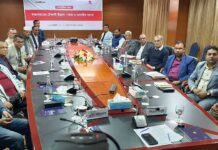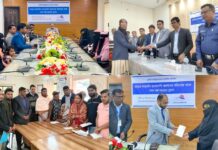Dhaka, 28 May 2025: Climate budget allocations in Bangladesh remain neither adequate nor well-planned, and the coastal regions continue to face growing risks due to the lack of protection infrastructure. Despite an increase in climate-induced losses and damages, budgetary allocations have not risen, and the demands of coastal communities have long been neglected. Speakers at a seminar today called for a minimum of 3% of GDP to be allocated for climate financing in the upcoming national budget of 2025-26. They further urged the government to priorities sectorial allocations to safeguard the lives and livelihoods of nearly 40 million people living in the climate-vulnerable coastal belt of Bangladesh. Urgent investments are needed, including the construction of durable embankments, coastal afforestation, sustainable rehabilitation for climate-displaced populations, and water resource management, including addressing the acute crisis of safe drinking water, sanitation, and the development of climate-resilient agriculture and irrigation systems.
The demand came during a seminar titled “National Budget 2025-26: Climate Budget and Coastal Bangladesh”, held today at the CIRDAP Auditorium, Topkhana Road, Dhaka. The event was organized by EquityBD, a network of civil society organizations, in association with COAST Foundation, CPRD, CDP, Waterkeepers Bangladesh, Sundarban Protection Movement, BCJF, Udayan, DUS and SDI.
The seminar was chaired by Mr. Gawher Nayeem Wahra, Disaster Management expert and moderated by Rezaul Karim Chowdhury, Executive Director, COAST Foundation. Other speakers included A.H.M. Hamidur Rahman Azad, Assistant Secretary General, Bangladesh Jamaat-e-Islami; Umama Fatema, spokesperson, Anti-Discrimination Movement; Javed Rasin, Joint Convener, National Citizen Party (NCP); Kawsar Rahman, President, Bangladesh Climate Change Journalists Forum; Md. Motahar Hossain, Secretary, Environmental Journalists Forum; Md. Rafiqul Alam, Executive Director, DUS; Syed Jahangir Hasan Masum, Executive Director, CDP; Ashraf Hossain, Assistant Director, SDI; Aminur Rasul Babul, Executive Director, Unnayan Dhara Trust; and AHM Bazlur Rahman, Executive Director, BNNRC. The keynote was presented by M. A. Hasan, Head- Climate Change, COAST Foundation.
Gawher Nayeem Wahra stated that the Bangladesh Delta Plan cannot be implemented without resolving transboundary river issues. He asked for greater involvement of local communities in embankment management. He also highlighted that 45% of the population of Bangladesh is children, yet they remain unaware of national budget processes. He urged a search for effective alternatives to protect the Sundarbans and emphasized the importance of transparent water governance, safe migration policies, and institutional accountability.
In his remarks, Rezaul Karim Chowdhury emphasized that climate budget allocation should be at least 3% of the national GDP. He mentioned that we should focus on constructing concrete / stone embankments and advocate for the establishment of climate-resilient water purification plants. He also stressed the need for integrated research to guide climate adaptation.
A.H.M. Hamidur Rahman Azad pointed out that despite the implementation of several mega projects over the years, coastal communities have been largely sidelined. He called for stronger connectivity between hard-to-reach areas and the mainland, as well as skill development programs for displaced coastal populations. He also urged for budget formulation based on local available resources and highlighted the importance of institutional capacity building for organizations/departments involved in natural resource management.
Umama Fatema, Spokesperson, Anit Discrimination Student Movement criticized the previous government’s several destructive projects, such as the Rampal and Matarbari coal power plants. She noted that coastal forest areas have been devastated by the rise of shipbreaking industries near protected zones. Highlighting the gap between budget formulation and actual expenditure, she emphasized effective implementation and monitoring. She added the importance of river dredging to ensure safe water supply.
Javed Rasin, Joint Convenor, NCP, advocated both embankment protection and afforestation initiatives. He noted that women in coastal areas are affected by climate change. He demanded budget allocations to address their health needs.
Please download related paper [Bangla Press] [English Press] [Presentation] [Position Paper Bangla] [Position Paper English] [English Position Paper]
Photos
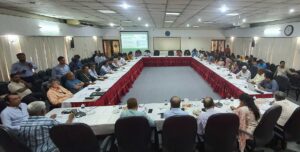 |
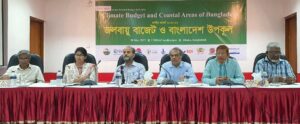 |
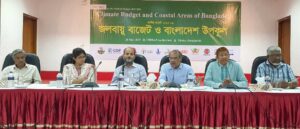 |
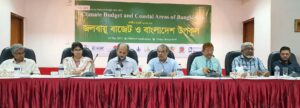 |
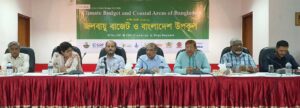 |
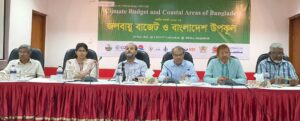 |
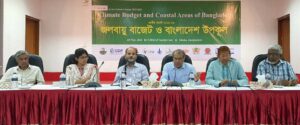 |
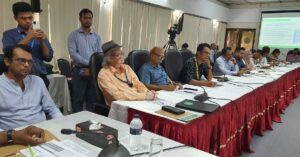 |
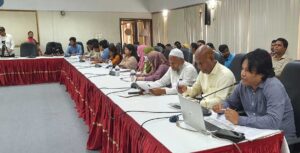 |
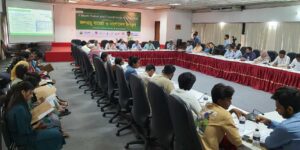 |
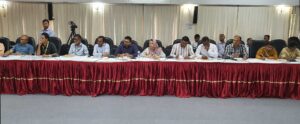 |
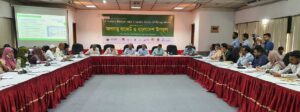 |
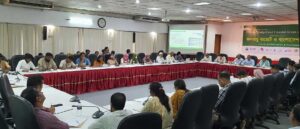 |
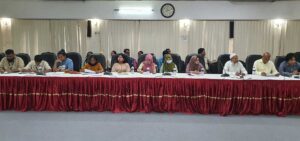 |
Newslink
 |
 |
 |
|
 |
 |
 |
 |
 |
|
 |
 |
 |
 |


